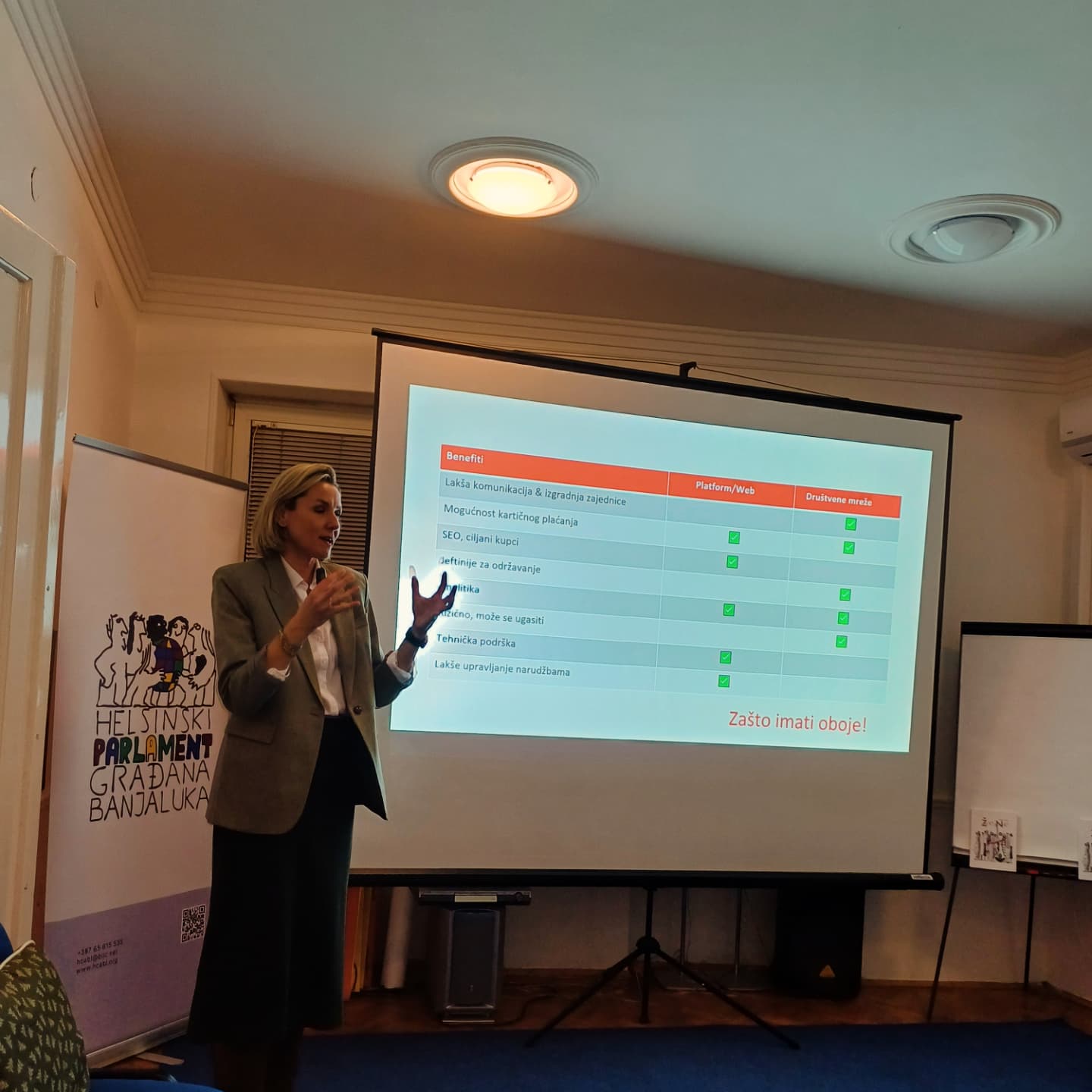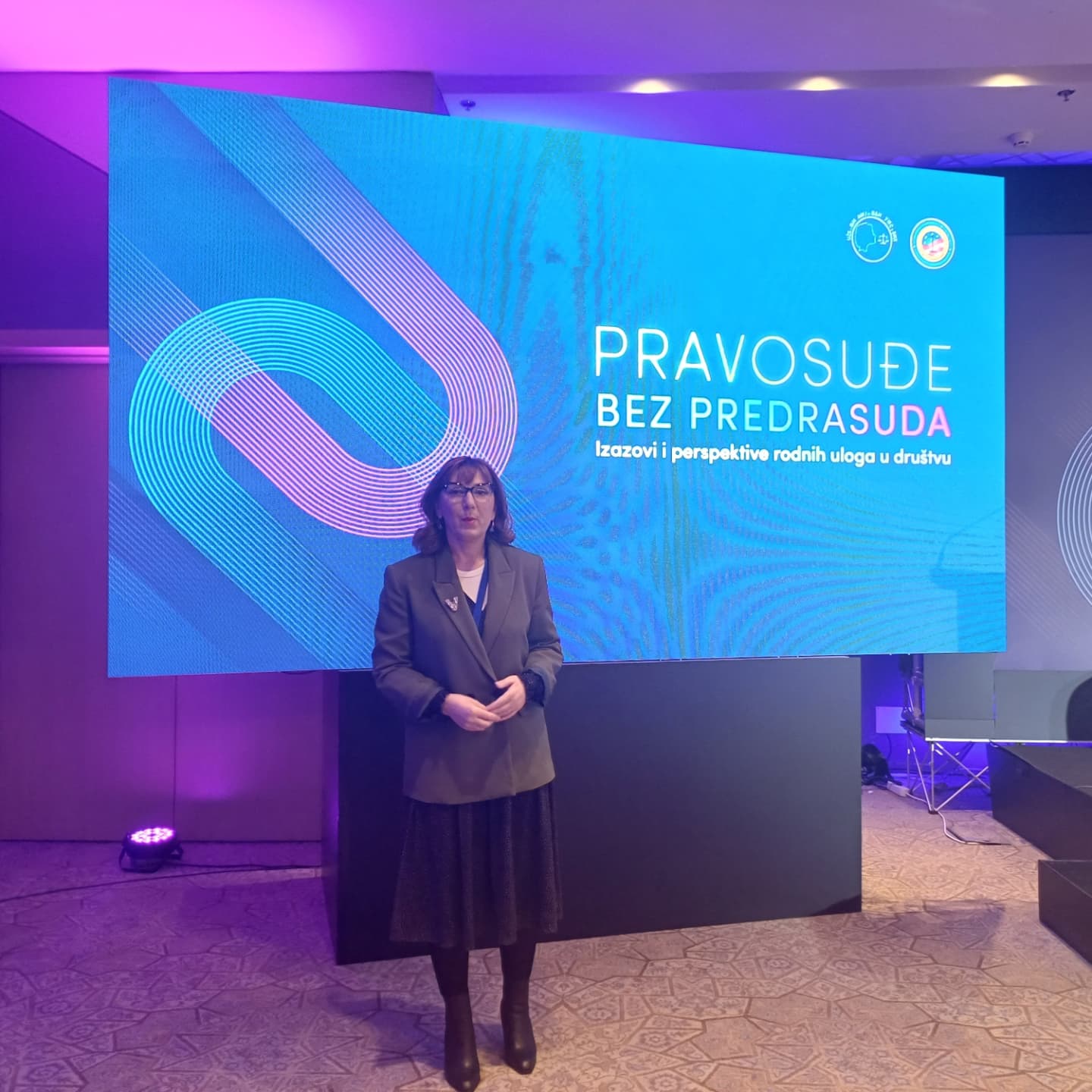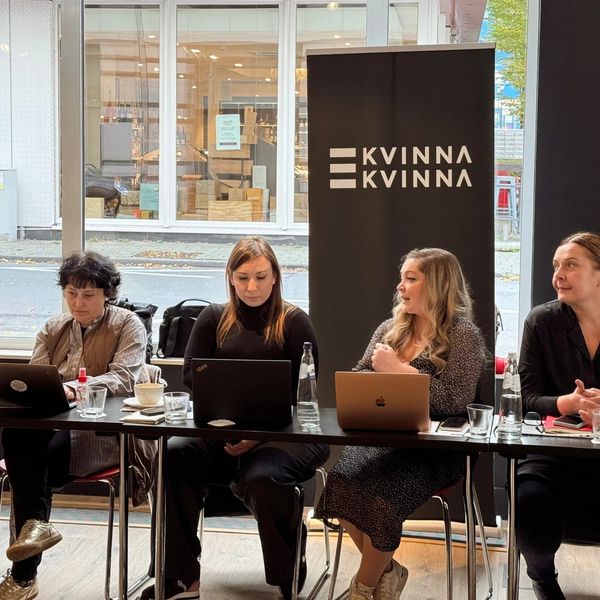The Constitution of Bosnia and Herzegovina should be changed for the purpose of equality of men and women, but also of all citizens in the entire territory of BiH.
Close to 90 percent of those questioned in the survey conducted by the Initiaitve Women Citizens for Constitutional Reform believe that the Constitution of Bosnia and Herzegovina (BiH) is not good – about 57 percent think it should be changed, and close to 31 percent think a new one should be written.
The largest percentage of respondents (71.4 percent) believe that the Constitution of BiH should contain affirmative measures to eliminate inequality between men and women. This is the opinion of 75.4 percent of respondents who identified themselves as Bosnians and Herzegovinans, 71.4 percent of those who identified themselves as Bosniaks, 65.9 percent of Croats and 58.0 percent of Serbs. Research data show that 38 percent of Bosnians and Herzegovinans believe that the Constitution of BiH should be changed in order to precisely define the equality of men and women. 38.6 percent of Croats, 29 percent of Bosniaks, and 22.9 percent of Serbs think so.

The priority changes to the Constitution of BiH advocated since 2013 by the Initiaitve Women Citizens for Constitutional Reform, which gathers 36 non-governmental organizations from all over BiH, are: the use of gender-responsive language in the Constitution of BiH; introduction of affirmative measures in the Constitution of BiH in order to achieve full gender and sexual equality; expansion of the existing Catalog of Rights with provisions related to unified health, social and family protection; greater judicial and legal protection of human rights and freedoms and the principle of direct democracy applied to the process of constitutional reform, i.e. the right of citizens to submit initiatives for changes to the Constitution of BiH.
Their demands are based on the recommendations of the UN Committee for the Elimination of Discrimination against Women (CEDAW Committee), according to which it is necessary that “member states, including BiH, provide explicit constitutional protection of formal and substantive equality and the absence of discrimination in public and private spheres of life, including all matters of personal status, family and marriage and inheritance law, across all legal fields”. Since 2013, the CEDAW Committee has called on the state of BiH several times to consider this issue.
The evaluation of the work of the Initiative from 2020 showed that the requirements, especially the first three priorities, are acceptable to most political parties, however – there is currently no political readiness to open the issue of constitutional changes on any basis, although 38.1 percent of respondents from research by the IWCfCR knows that the Constitution of BiH does not contain provisions that precisely define the equality of women and men, and 77.7 percent of the surveyed women and 67.9 percent of the surveyed men believe that the Constitution of BiH should contain affirmative measures to eliminate inequality between men and women.
“The Recommendation of the CEDAW Report for Bosnia and Herzegovina reads: In the light of the process of constitutional changes, the Committee recommends that the Member State specifically incorporate into the new Constitution the definition of equality between women and men and the prohibition of direct and indirect discrimination against women in the public and private sphere, in accordance with Articles 1 and 2 of the Convention”, explains Ana Vuković from the Gender Center of the Federation of BiH, which previously created more than 30 amendments to the Constitution of the Federation of BiH that would satisfy this Recommendation and prepared a seminar for parliamentarians for March 2023.
The Agency for Gender Equality of BiH created amendments to the Constitution of BiH which, among other things, include the introduction of gender equality as a constitutional category and the principle of equal opportunities.
President of the Constitutional Law Commission of the House of Representatives of the Parliamentary Assembly of BiH, Albin Muslić, believes that changes to the Constitution of BiH in the context of gender equality must be adopted as soon as possible.
“We simply have to do it as soon as possible because we are already adopting laws that define or contain elements of gender equality. Until then, perhaps we can make some guiding norm that says that gender-sensitive language must be used in all acts, and when we come to amendments to the Constitution – include that as well. In normal countries and societies, this is taken care of and it should be a part of regular activities, but in BiH everything is somewhat complicated”, explains Muslić and notes that two-thirds of the votes of representatives are needed to amend the Constitution of BiH. Putting a certain topic on the agenda requires the initiative of a parliamentary group or the Council of Ministers of BiH.
He emphasizes that before the Constitutional Law Commission of the House of Representatives of the Parliamentary Assembly of BiH, at the time this text was created, there were no requests or initiatives for changes to the Constitution of BiH. The members of this Commission, along with Muslić, are Milan Petković, Marinko Čavara, Darijana Filipović, Predrag Kojović, Amor Mašović, Obren Petrović, Nebojša Radmanović and Šerif Špago.
Longtime representative Saša Magazinović says that there are hundreds of initiatives for changes to the Constitution of BiH that come from citizens and non-governmental organizations, but that the procedure is such that these requests cannot go before the Parliament. He believes that, regardless of the initiatives, it is impossible to change the Constitution of BiH in any segment, including introducing gender-sensitive language or sex and gender equality into that act.
“If it is not possible to amend the article of the Constitution of BiH that does not allow a reduction in the salaries of representatives – how will we adopt anything else? This has nothing to do with the topic, but with the general picture and attitude towards the Constitution. Currently, there is not a single issue around which two-thirds of the representatives in both Houses can gather,” says Magazinović.
Representative Zlatko Miletić is also a pessimist; he doubts that it is possible to gather two-thirds of representatives on any issue, including amendments to the Constitution of BiH in that direction.
“Now everyone is focused on the Election Law, legitimate representation, another group will, when that topic is opened, demand the rights of Others, the election of members of the Presidency of BiH… I say this based on past experience. Maybe those requests could be pushed along with all the other requested changes, in a package, but I highly doubt it. In addition, I strongly doubt that in this convocation we will succeed in changing the Constitution of BiH in any element”, says Miletić and emphasizes that it would be best if, when the debate on amendments to the Constitution of BiH starts, all verdicts from Strasbourg, verdicts of domestic courts and civil initiatives should be combined and adopted all together.
The Chairman of the Commission for Gender Equality of the House of Representatives of the State Parliament, Miroslav Vujičić, does not believe that it is possible to incorporate gender-sensitive language into the Constitution of BiH.
“I know nothing about these initiatives, I have not seen them. Personally, I do not believe that it is possible to incorporate it into the Constitution, because in BiH, as soon as we come to the story of the Constitution, we come to difficult political issues and complicated topics. In addition, I think that the position of women in BiH is better than in some European countries, maybe even some Scandinavian ones, and that they are not discriminated against on any basis, and I do not know why this linguistic equality is so important,” says Vujičić.
The members of this Commission, along with Vujičić, are Mia Karamehić-Abazović, Rejhana Dervišević, Sabina Ćudić, Vlatko Glavaš, Amor Mašović, Ljubica Miljanović, Mira Pekić and Denijal Tulumović.
Is it because of this position of the representatives or for some other reason, but the citizens from the survey conducted by the Initiaitve WCfCR believe that the professional public should participate in the writing of the new Constitution of BiH (88.3 percent of respondents), then the European Union (35.1 percent ), NGO sector (33.8 percent), entity authorities (20 percent), businessmen (15.3 percent), OHR (13.6 percent), political parties (13.5 percent) and religious institutions (4. 6 percent). At the same time, the largest number of respondents (72.2 percent) believe that the new Constitution should have a precisely defined possibility for individuals and groups to launch an initiative to amend the Constitution.
Delila Hasanbegović Vukas from the Sarajevo Open Center in 2022, for the purposes of the Digital Advocacy project of the CURE Foundation, did an analysis of the justification of the Initiative’s request.
The analysis states that the language and grammatical forms used in the Constitution of BiH in no way demonstrate the existence of the feminine gender in our language, i.e. its norms in use (Bosnian, Croatian, Serbian), and do not create the image that men and women in BiH are equal in achieving of all rights and freedoms. As language is an issue and a reflection of power, it would certainly be important in the amendments to the Constitution of BiH to opt for either the use of forms of both genders or to introduce the form of the pronouns all, each or the nouns of persons, individuals and the like, thereby ensuring full equality in the use of both masculine and feminine forms which is in the spirit of our native languages. The use of gender-responsive language in the text of the Constitution is one of the ways to overcome discrimination and the invisibility of women in society.
Guided by international documents, which the state signed and ratified, and by the obligation to harmonize laws and regulations with the legal system of the European Union, BiH has the obligation to fulfill human rights standards in the field of health and social protection systems, the analysis adds. The existing catalog of rights needs to be expanded with provisions that guarantee the specific rights of women in private and public life. These rights include: prohibition of violence based on sex and gender, gender identity and sexual orientation, equality of spouses when entering into marriage, during its duration and upon dissolution of marriage, freedom to decide on reproductive health, special protection enjoyed by mothers and single parents, as well as protection of women’s work status when hiring and especially protection against dismissal during pregnancy and maternity leave. Also, in addition to the fact that Bosnia and Herzegovina is defined by the constitution as a democratic state, it is necessary to add the term “social” (Article 1, Paragraph 2) in order to have a favorable environment and ensure full gender equality as part of social justice and equality guaranteed by social country.
In the entire text of the Constitution of BiH, according to the analysis, it prefers the collective rights of the constituent peoples over the individual, civil rights, and the General Right of Equality is characteristically listed in the first place in the catalog of basic human rights. This, to a certain extent, normatively compensates for what the political creation of Bosnia and Herzegovina suffers from the most, which is the strict differentiation between the members of the three constitutive nations. That is why it would be significant if changes to the Constitution guarantee individual rights in all segments of work and activity in BiH, while respecting all international standards achieved.
According to that analysis, the Constitution of BiH should include provisions that ensure judicial legal protection of human rights and freedoms, as well as explicitly state the equality of all before the courts in the state of BiH.
The Constitution of BiH, it is added, does not at all provide for access to citizens to initiate initiatives for its amendments, which deprives citizens of influencing the realization of their existential rights. In addition, the Constitution of BiH did not single out a single issue on which citizens could directly express their political will, although numerous international agreements ratified by BiH provide a basis for direct participation of citizens in decision-making.
And according to the findings from the research of the Initiaitve Women Citizens for Constitutional Reform, the most important reasons for changing or writing a new Constitution of BiH are the need for a precise definition of all human rights that are protected, equal health and social protection for all residents of BiH throughout the territory of BiH, elimination of discrimination during the election of members of the Presidency of BiH, greater powers for the state of BiH, elimination of discrimination during elections to the House of Peoples of BiH, a precise definition of the equality of men and women and the incorporation or application of gender-sensitive language.
About 75 percent of the respondents in this survey believe that the existing Constitution of BiH completely or to some extent inhibits and slows down the progress of BiH, and 91.2 percent of the 2,000 respondents believe that the negotiations on changing the Constitution of BiH serve domestic politicians to maintain political instability in the country. .
Although for now citizens’ associations or citizens’ initiatives cannot submit a request for changes to the Constitution of BiH, the Initiative translated its priorities into 12 amendments published in the publication “Platform of Women’s Priorities for Constitutional Changes with Amendments to the Constitution of Bosnia and Herzegovina from a Gender Perspective”.
And when it comes to that, it is important to know that according to the current Constitution of BiH (Article X – Changes and Amendments), that act can be amended and supplemented by a decision of the Parliamentary Assembly, which includes a two-thirds majority of those present and who voted in the House of Representatives. In addition (Article 19), within three months from the entry into force of the Constitution of BiH, the Entities will amend their constitutions through the amendment procedure in order to ensure compliance with the Constitution of BiH because (Article III, Paragraph 3, Point (b)) states that the Entities and all their administrative units will fully comply with this Constitution, which repeals the legal provisions of Bosnia and Herzegovina and the constitutional and legal provisions of entities that do not agree with it, as well as the decisions of the institutions of Bosnia and Herzegovina. The general principles of international law are part of the legal order of Bosnia and Herzegovina and its entities.
The Initiative Women Citizens for Constitutional Reform (WCfCR) is an informal initiative of 36 civil society organizations (CSOs) and activists that advocates for the reform of the Constitution of Bosnia and Herzegovina (BiH) in order to ensure greater protection of human rights and freedoms, with a special focus on the gender perspective. The initiative was launched in 2013, and the coordinating organization is the Helsinki Citizens’ Assembly Banja Luka.
The text was written by Rubina Čengić
Text taken from: http://www.discriminacija.ba





